- Home
- T. H. White
The Book of Merlyn Page 2
The Book of Merlyn Read online
Page 2
Pendragon can still be saved. Another salvation was involved.
White had gone to Belmullet assuming himself to be at home in Ireland. He came away an Englishman in exile. He had been received, and welcomed as something new to talk about; he had never been accepted. Another Ancient Wrong forbade it—the cleft between the hated and the hating race. He was believed to be a spy (the rumour of an English invasion had kept most of Belmullet sitting up all night); his movements were watched; he was reported to the police and not allowed to leave the mainland; he had joined the local security force, but was asked not to attend parades. His disillusionment may have been rubbed in by the parallel with The Candle in the Wind, where Arthur’s goodwill is of no avail against his hereditary enemies. Now another winter lay before him, a winter of intellectual loneliness, with only himself to consult, only himself to feed on. He had a roof over his head, a room to be alone in, regular meals, the hedged landscape of County Meath to walk his dog in, nothing much to complain of, nothing to go on with. War had imprisoned him in a padded cell.
It was his own salvation he leaped at.
On December 6th, he wrote to L. J. Potts, formerly his tutor at Cambridge, continuously his Father Confessor in Letters: “The next volume is to be called The Candle in the Wind (one has to add D.V. nowadays)… It will end on the night before the last battle, with Arthur absolutely wretched. And after that I am going to add a new 5 th volume, in which Arthur rejoins Merlyn underground (it turns out to be the badger’s sett of Vol. 1) and the animals come back again, mainly ants and wild geese. Don’t squirm. The inspiration is godsent. You see, I have suddenly discovered that (1) the central theme of Morte d’Arthur is to find an antidote to war, (2) that the best way to examine the politics of man is to observe him, with Aristotle, as a political animal. I don’t want to go into all this now, it will spoil the freshness of the future book, but I have been thinking a great deal, in a Sam Butlerish way, about man as an animal among animals—his cerebrum, etc. I think I can really make a comment on all these futile isms (communism, fascism, conservatism, etc.) by stepping back—right back into the real world, in which man is only one of the innumerable other animals. So to put my ‘moral’ across (but I shan’t state it), I shall have the marvellous opportunity of bringing the wheel full circle, and ending on an animal note like the one I began on. This will turn my completed epic into a perfect fruit, ‘rounded off and bright and done.’ “
On the same day he wrote to Garnett, asking what book it was in which Garnett alleged having read that Malory raided a convent, and continuing, “So far as I can see, my fifth volume is going to be all about the anatomy of the brain. It sounds odd for Arthur, but it is true. Do you happen to know, off hand, of a pretty elementary but efficient book about brain anatomy in animals, fish, insects, etc. ? I want to know what sort of cerebellum an ant has, also a wild goose. You are the sort of person who would know this.”
Though White uses the future tense in his letter to Potts, it is unlikely that he waited from November 14th to December 6th before beginning The Book of Merlyn. Book 5, taking up where the original Book 4 ended, has an immediacy of plain statement that could not have brooked much delay. Arthur is still sitting alone in his tent at Salisbury, awaiting his last battle in the final insolvency of his hopes, and weeping the slow tears of old age. When Merlyn enters to renew their former master-pupil relationship and sees the extent of Arthur’s misery, he is not sure whether he can do so at this late hour. His assurance that legend will perpetuate Arthur and the Round Table long after history has mislaid them falls on inattentive ears. He invokes their past relationship. The pupil has outgrown the master and puts him off with a Le roy s’adviser a. Nowhere in the four previous volumes had White made Arthur so much a king as in this portrayal of him defeated. In Farewell Victoria, his novel of the early thirties, he hit on the phrase “the immortal generals of defeat.” In the first chapter of The Book of Merlyn he substantiated it.
But the scheme of Book 5 is to take Arthur underground, where the animals of Book 1 are waiting to talk to him, and where Merlyn is to subject him to the contents of White’s notebook so that he may discover what can be learned from animals about the abolition of war.
Since animals avoid warring with their kind, this could be a good subject to examine.
But the discussion is slanted from the first by Merlyn’s insistence on the inferiority of man. Liber scriptus proferetur … Merlyn has opened White’s notebook, and finds small evidence that man deserves to be placed among the two thousand eight hundred and fifty species of mammalian animals in the world. They know how to behave befittingly, existing without war or usurpation. Man does not. Merlyn weakens the denunciation by adding the insult that man is a parvenu.
At this point no one present is impious enough to suggest that man may do better in time.
At a later stage of the discussion Arthur, the representative of the parvenu species, suggests that man has had a few good ideas, such as buildings and arable fields. He is put in his place by the achievements of coral animals, beavers, seed-carrying birds, and finally felled with the earthworm, so much esteemed by Darwin. The distinction between performing and planned performance is not allowed to occur to him, and the conversation sweeps on to nomenclature: Homo ferox (sapiens being out of the question), Homo stultus, Homo im-politicus. The last is the most damning; man must remain savage and dunderheaded till, like the other mammalian species, he learns to live peaceably.
It is easy to pick holes in White’s rhetoric. The Book of Merlyn was written with the improvidence of an impulse. It holds much that is acute, disturbing, arresting, much that is brilliant, much that is moving, besides a quantity of information. But Merlyn, the main speaker, is made a mouthpiece for spleen, and the spleen is White’s. His fear of the human race, which he seemed to have got the better of, had recurred, and was intensified into fury, fury against the human race, who make war and glorify it.
No jet of spleen falls on the figure of Arthur. Whenever he emerges from the torrent of instruction, he is a good character: slow to anger, willing to learn, and no fool. He is as recuperable as grass, and enjoys listening to so much good talk. When Merlyn tells him that to continue his education he must become an ant, he is ready and willing. Magicked into an ant, he enters the ants’ nest which Merlyn keeps for scientific purposes. What he sees there is White’s evocation of the totalitarian state. Compelled by his outward form to function as a working ant, he is so outraged by the slavish belligerence and futility of his fellow workers that he opposes an ant army in full march, and has to be snatched away by Merlyn.
For his last lesson White consigns him to what by then must have seemed an irrecoverable happiness: the winter of 1938 when he went goose shooting.
It is an insight into how many experiences White packed into his days and how vividly he experienced them that little more than two years had elapsed between Grief for the Grey Geese and The Book of Merlyn. He had taken the goose book with him when he went to fish in Ireland, and Chapter 12 of The Book of Merlyn opens with its description of the dimen-sionless dark flatness of the Lincolnshire Wash and the horizontal wind blowing over it. But now it is Arthur, become a goose, who faces the wind and feels the slob under his webbed feet, though he is not completely a goose as he has yet to fly. When the flock gathers and takes off for the dawn flight, he rises with it.
The old patch shames the new garment. In that winter of two years before, White was at the height of himself, braced against an actual experience, his senses alert, his imagination flaring like a bonfire in the wind. “I am so physically healthy,” he wrote to Sydney Cockerell, “that I am simply distended with sea-air and icebergs and dawn and dark and sunset, so hungry and sober and wealthy and wise, that my mind has gone quite to sleep.”
At Doolistown his mind was insomniac, vexed, and demanding. It allowed him to extend the vitality of the old patch over the few pages where Arthur watches the geese. But with Chapter 13 the intention to convince drives
out the creative intention to state, and with but one intermission—when the hedgehog leads Arthur to a hill in the west-country, where he sits looking at his sleeping kingdom under the moon and is reconciled to the bad because of the good—the book clatters on like a factory with analysis, proof and counterproof, exhortation, demonstration, explanation, historical examples, parables from nature—even the hedgehog talks too much.
Yet the theme was good, and timely, and heartfelt, and White preserves an awareness of persons and aerates the dialectics with traits of character and colloquial asides. It is clear from the typescript that he recognized the need for this, for many of these mitigations were added by hand. Whenever he can escape from his purpose—no less aesthetically fell for being laudable—into his rightful kingdom of narrative, The Book of Merlyn shows him still master of his peculiar powers. It is as though the book were written by two people: the storyteller and the clever man with the notebook who shouts him down.
Perhaps he went astray in that stony desert of words and opinions because he lacked his former guide. In the final chapter, Malory has returned. Under his tutelage White tells how, after Arthur’s death in battle, Guenever and Lancelot, stately abbess and humble hermit, came to their quiet ends. These few pages are among the finest that White ever wrote. Cleverness and contention and animus are dismissed: there is no place for them in the completed world of legend, where White and Malory stand farewelling at the end of the long journey that began by lamplight in the gamekeeper’s cottage at Stowe Ridings.
This is the true last chapter of The Once and Future King, and should have its place there. Fate saw otherwise. “I have suddenly discovered that… the central theme of Morte d’Arthur is to find an antidote to war.” To give weight to his discovery by making it seem less sudden, White incorporated new material into the already published three volumes. In November 1941 he sent them, together with The Candle in the Wind and The Book of Merlyn, to his London publisher, to be published as a whole. Mr. Collins was disconcerted. He replied that the proposal would need thinking over. So long a book would take a great deal of paper. The prosecution of war made heavy demands on the paper supply: forms in triplicate, regulations, reports, instructions to civilians, light reading for forces, etc. White insisted that the five books should appear as a whole. After prolonged negotiations, in the course of which White’s demand to see The Book of Merlyn in proof escaped notice—a grave pity, for he was accustomed to rely on print to show up what was faulty or superfluous—the fivefold Once and Future King was laid by.
The Once and Future King was not published till 1958. It was published as a tetralogy. The Book of Merlyn, that attempt to find an antidote to war, had become a war casualty.
Sylvia Townsend Warner
Introducing The Book of Merlyn
WE NOW FIND King Arthur of England, sitting in his campaign tent on the eve of battle. Tomorrow, he will face his bastard son Mordred and that youth’s army of Nazi-like Thrashers on the battlefield.
His reign has been painfully long for Arthur, and he is bent with age and sadness and defeat. After a happy youth at Sir Ector’s castle in the Forest Sauvage, where Merlyn the magician introduced him to the political ideologies found in the animal kingdom by temporarily transforming him into various beasts, Arthur was placed on the throne by destiny, compelled by his sense of justice and harmony to create the “civilized world” and the famous Round Table, to stimulate the Quest for the Holy Grail in an effort to keep man from killing man.
But a darker fate also dictated his ignorant siring of an illegitimate son by his own half sister and forced his wife Guenever and his best knight Lancelot into each other’s arms, thus causing rivalry, deceit, and jealousy among the knights.
These last proved to be the old king’s downfall. Forgotten were his achievements for the Might of Right and for peace on earth. Forgotten too was his own anguish at having tried his best and failed. The Quest had led nowhere, the Round Table was dispersed. Now Guenever was besieged by Mordred and his Thrashers in the Tower of London and Lancelot was exiled in France, both victims of Mordred’s obsession to gain Arthur’s throne.
So now Arthur is alone, fulfilling his royal duties by absentmindedly going through the day’s paperwork, feeling his losses and his pain. He looks up at a movement at his tent door.
The Book of Merlyn
Incipit Liber Quintus
He thought a little and said:
“I have found the Zoological Gardens
of service to many of my patients.
I should prescribe for Mr. Pontifex
a course of the larger mammals.
Don’t let him think he is taking
them medicinally. …”
1
IT WAS NOT the Bishop of Rochester.
The king turned his head away from the newcomer, incurious as to his identity. The tears, running down his loose cheeks with their slow plods, made him feel ashamed to be seen: yet he was too vanquished to check them. He turned stubbornly from the light, unable to do more. He had reached the stage at which it was not worth-while to hide an old man’s misery.
Merlyn sat down beside him and took the worn hand, which made the tears flow faster. The magician patted the hand, holding it quietly with a thumb on its blue veins, waiting for life to revive.
“Merlyn?” asked the king.
He did not seem to be surprised.
“Are you a dream?” he asked. “Last night I dreamed that Gawaine came to me, with a troupe of fair ladies. He said they were allowed to come with him, because he had rescued them in his lifetime, and they had come to warn us that we should all be killed tomorrow. Then I had another dream, that I was sitting on a throne strapped to the top of a wheel, and the wheel turned over, and I was thrown into a pit of snakes.”
“The wheel is come full circle: I am here.”
“Are you a bad dream?” he asked. “If you are, do not torment me.”
Merlyn still held the hand. He stroked along the veins, trying to make them sink into the flesh. He soothed the flaky skin and poured life into it with mysterious concentration, encouraging it to resilience. He tried to make the body flexible under his finger-tips, helping the blood to course, putting a bloom and smoothness on the swollen joints, but not speaking.
“You are a good dream,” said the king.” I hope you will go on dreaming.”
“I am not a dream at all. I am the man whom you remembered.”
“Oh, Merlyn, it has been so miserable since you left! Everything which you helped to do was wrong. All your teaching was deception. Nothing was worth doing. You and I will be forgotten, like people who never were.”
“Forgotten?” asked the magician. He smiled in the candle light, looking round the tent as if to assure himself of its furs and twinkling mail and the tapestries and vellums.
“There was a king,” he said, “whom Nennius wrote about, and Geoffrey of Monmouth. The Archdeacon of Oxford was said to have had a hand in him, and even that delightful ass, Gerald the Welshman. Brut, Layamon and the rest of them: what a lot of lies they all managed to tell! Some said that he was a Briton painted blue, some that he was in chain mail to suit the ideas of the Norman romancers. Certain lumbering Germans dressed him up to vie with their tedious Siegfrieds. Others put him into plate, like your friend Thomas of Hutton Coniers, and others again, notably a romantic Elizabethan called Hughes, recognised his extraordinary problem of love. Then there was a blind poet who tried to justify God’s ways to man, and he weighed Arthur against Adam, wondering which was the more important of the two. At the same time came masters of music like Purcell, and later still such titans as the Romantics, endlessly dreaming about our king. There came men who dressed him in armour like ivy-leaves, and who made all his friends to stand about among ruins with brambles twining round them, or else to swoon backward with a mellow blur kissing them on the lips. Also there was Victoria’s lord. Even the most unlikely people meddled with him, people like Aubrey Beardsley, who illustrated his histo
ry. After a bit there was poor old White, who thought that we represented the ideas of chivalry. He said that our importance lay in our decency, in our resistance against the bloody mind of man. What an anachronist he was, dear fellow! Fancy starting after William the Conqueror, and ending in the Wars of the Roses … Then there were people who turned out the Morte d’Arthur in mystic waves like the wireless, and others in an undiscovered hemisphere who still pretended that Arthur and Merlyn were the natural fathers of themselves in pictures which would move. The Matter of Britain! Certainly we were forgotten, Arthur, if a thousand years and half a thousand, and yet a thousand years again, are to be the measure of forgetfulness.”
“Who is this Wight?”
“A fellow,” replied the magician absently. “Just listen, will you, while I recite a piece from Kipling?” And the old gentleman proceeded to intone with passion the famous paragraph out of Pook’s Hill: “‘I’ve seen Sir Huon and a troop of his people setting off from Tintagel Castle for Hy-Brasil in the teeth of a sou’-westerly gale, with the spray flying all over the castle, and the Horses of the Hill wild with fright. Out they’d go in a lull, screaming like gulls, and back they’d be driven five good miles inland before they could come head to wind again. … It was Magic—Magic as black as Merlin could make it, and the whole sea was green fire and white foam with singing mermaids in it. And the Horses of the Hill picked their way from one wave to another by the lightning flashes! That was how it was in the old days!’
“There is description for you,” he added, when he had finished the piece. “There is prose. No wonder that Dan cried ‘Splendid!’ at the end of it. And all was written about ourselves or about our friends.”
“But Master, I do not understand.”
The magician stood up, looking at his ancient pupil in perplexity. He twisted his beard into several rat tails, put the corners in his mouth, twirled his moustachios, and cracked his finger joints. He was frightened of what he had done to the king, feeling as if he were trying to revive a drowned man with artificial respiration, who was nearly too far gone. But he was not ashamed. When you are a scientist you must press on without remorse, following the only thing of any importance, Truth.

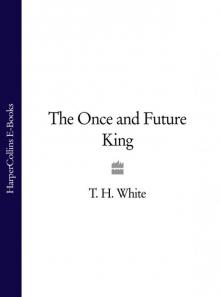 The Once and Future King (#1-4)
The Once and Future King (#1-4)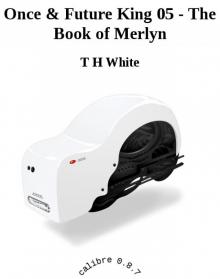 Once & Future King 05 - The Book of Merlyn
Once & Future King 05 - The Book of Merlyn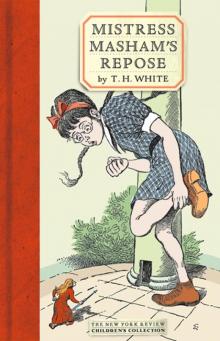 Mistress Masham's Repose
Mistress Masham's Repose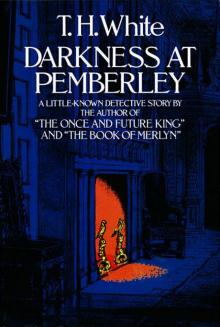 Darkness at Pemberley
Darkness at Pemberley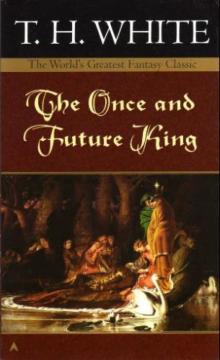 The Once and Future King
The Once and Future King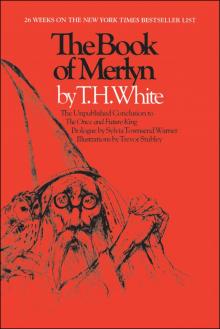 The Book of Merlyn
The Book of Merlyn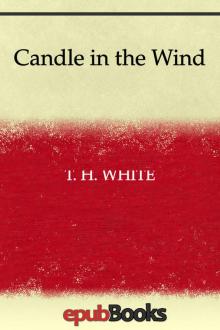 Candle in the Wind
Candle in the Wind